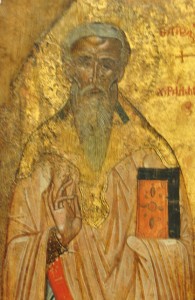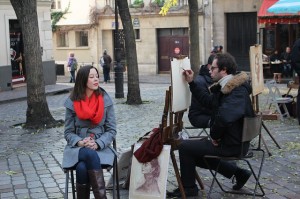Athanasian Psalter Look Away That I May Breathe Again

We Christians proclaim "the gospel." The word means "good news." What happens when what we tell the world sounds old and worn — not "news" at all. Worse still, what happens when what we say doesn't actually sound "good" to people? Sometimes looking away from our tracts and truisms, looking back to what Christians used to say about Jesus can be like a cool breeze in a stuffy closed house.
Today is the commemoration of one of my favorite thinkers in all of Christian history: St. Athanasius of Alexandria (c. 297-373). There's a guy whose old teaching is good news today.
For a very long time in Western Christianity we have tended to focus on sin as a legal problem: sin is a crime, a law broken which a just God is obliged to punish. This sense of the problem predisposes us to focus on the legal aspects of God's solution — Christ's sacrifice on the Cross as a satisfaction of the problems of divine justice.
There is a great deal of biblical truth to that sense of the story — even if it did not become so dominant until the Middle Ages.
One problem, though, is that this telling of the gospel has been said, and written, and packaged and repackaged until in a sense it is not "news."
Another problem is that for many today it doesn't actually sound "good." People have a hard time seeing their own behavior as breaking a law subject to the death penalty. We end up having to convince people that they have a problem they don't feel so that we can present them with Jesus as the solution.
That is, no matter how true, we have to spend our energy convincing people of the bad news so that the gospel can make sense.
Athanasius doesn't start by looking at the Cross. Athanasius starts with the amazing fact that in Jesus Christ the eternal God became human. Check out his classic work On the Incarnation.
Here's the short version:
We were created in the image of God, intended to live forever in communion with God, gazing toward God and moving toward God and becoming ever more like God.
Humanity sinned — but instead of thinking about disobedience and crime, think of human beings turning away from God and moving the opposite direction.
Moving toward God is life. Moving away from God is death.
Athanasius calls the problem "corruption" but he isn't thinking of politicians taking bribes. Corruption is what happens when we die.
When we are alive all our systems are functioning and all our parts stay together. Once we die we don't function. Our bodies fall apart. We decay. That is why we bury dead bodies — because what was a highly organized living being is, slowly or quickly, going to become soil again.
That loss of life, death and decay is, for Athanasius, the fundamental problem. We were intended to live and thrive and express the image of God. It is a horrible tragedy that something God made so good should fall into corruption and non-existence.
Enter Jesus Christ.

Athanasius describes how Jesus Christ being born is the essential move in the process of our salvation:
Imagine God the Father as a painter. God the Son is the spitting image of his Father. The Father has the Son, the Word, sit to have his portrait painted — and we human beings are that portrait.
The Son IS the image of God. We are IN the image of God — like a painting is different from, but similar to, the one who sat before the artist.
Then the painting got ruined — smeared and smudged by sin we just don't look like the image of God any more.
God doesn't trash the painting. God restores the painting — through Jesus.
The Son comes to sit before the artist once again, so that we can be restored as God's painting. When Jesus comes, the Image of God is restored in humanity.
So if you are still with me, here's the deal: people today can make good sense of Athanasius' sense of the human problem. We know what it means to say we have turned away from God; we're used to pursuing everything but God. We know what it means to have any similarity to God's image in our lives ruined; think of abuse, addiction, apathy, arrogance — and in the dictionary of death-dealing things that is just the start of the "A" section.
Athanasius diagnoses our problem. Turning from the God who is life we find death. Our careers may thrive but our lives fail.
Athanasius presents Jesus as a solution who makes sense. When we had fallen apart, and were aiming toward death, Jesus, the very Image of God came and began to restore us. Instead of chaos and decay, in him we see clarity, unity, life itself gushing from its Source.
Joined to Jesus by faith we too move toward restoration — and hand in hand our lives turn toward God in the journey of a lifetime.
————
P.S. I hope you'll subscribe for regular updates — I post about twice a week bringing historical Christianity into conversation with today's culture.
Gary Neal Hansen
————
I'd love to hear from you in the comments: How would you describe the central human problem? How are today's Christians doing at proclaiming Christ as a solution that is both "good" and "news"?
Click here to see more posts on role models for today's Christians (aka "Saints"!)
Source: https://garynealhansen.com/how-can-the-gospel-be-good-news-again-st-athanasius-of-alexandria/
0 Response to "Athanasian Psalter Look Away That I May Breathe Again"
Post a Comment